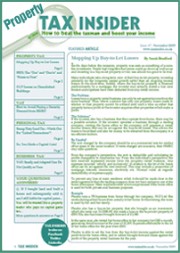Before you go, sign up to our free tax saving email course. Get 7 top property tax saving strategies in your email inbox that will help you save thousands in tax. Unsubscribe any time.
 The term “joint ownership” refers to “beneficial” not “legal” joint ownership; tax consequences follow beneficial ownership. The term “joint ownership” refers to “beneficial” not “legal” joint ownership; tax consequences follow beneficial ownership.Rates of Income Tax The renting out of property produces rental income which is subject to income tax on the part of the beneficial owner of the property (less relevant tax deductible expenses e.g. management fees; repairs; maintenance etc). The highest rate of income tax for the tax year 2010/11 is 50%. 50/50 Rental Profit Split Where a property is owned jointly by spouses, each spouse is subject to income tax on 50% of the rental profit irrespective of the respective percentage ownership of the property by each spouse. Thus, for example, if one spouse owns 80% and the other spouse owns 20% of the property any rental profit is still treated as arising to each spouse as to 50/50 for income tax purposes. If each spouse is liable to income tax at the same marginal rate, the 50/50 split is acceptable for tax purposes. However if, for example, one spouse is liable at the 50% marginal rate and the other spouse has no taxable income, it is income tax inefficient for the rental profit to be split 50/50. Other Than 50/50 Rental Profit Split In the above scenario it would be more tax-efficient if, say, 99% of the rental income was subject to income tax on the part of the spouse who has no other taxable income. This is achievable, but it requires that the underlying ownership of the property is in line with the rental profit split i.e. 99%/1%. It is also necessary for Form 17 ‘Declaration of beneficial interest in joint property and income’ to be filed with HMRC. In the event that the form is not so filed (even if the ownership percentages are 99%/1%) the rental profit is split 50/50 for income tax purposes. Making the 50/50 Rental Profit Split Work It may be that one spouse owns 100% beneficially of the property but is exposed to a marginal rate of income tax at 50% whereas the other spouse has no taxable income. However, the former spouse may not wish to transfer any material percentage of the ownership of the property to the latter spouse but would still like to reduce his (or her) 50% liability to income tax on the rental profit. To achieve this, the former spouse could simply transfer, say, only 1% of the ownership of the property to the latter spouse with no Form 17 being filed. The result would be that the former spouse still owns 99% of the property but the rental profit subject to income tax on each spouse is split in the ratio 50/50; effectively, the former spouse by transferring only 1% of the ownership of the property has reduced his (or her) income tax charge from 50% on 50% of the rental profit to the rate of income tax applicable to the other spouse (e.g. nil or 20%) on 50% of the income. Transfer Post Marriage An individual may own a property 100% beneficially but after marriage wishes to transfer (e.g. by gift) some percentage to the new spouse. The rental profit split may then either be 50/50 (irrespective of the percentage ownership transferred) or in line with the ownership percentages (assuming Form 17 is also completed). Capital Gains Tax (CGT) Transfers of ownership (in whole or in part) of property between spouses precipitate no CGT charge and no stamp duty land tax charge (assuming no mortgage). On any future sale CGT charges arise but joint ownership permits each spouse to utilise their CGT annual exempt amount (£10,100 for tax year 2010/11) to mitigate the aggregate charge. Practical Tip Don’t forget to file Form 17 as soon as possible where necessary. Appreciate that transfers to the other spouse may be disadvantageous in the event of marriage breakdown. By Malcolm Finney This is a sample article from the monthly Property Tax Insider magazine. Go here to get your first free issue of Property Tax Insider. |


 Tax Articles
Tax Articles